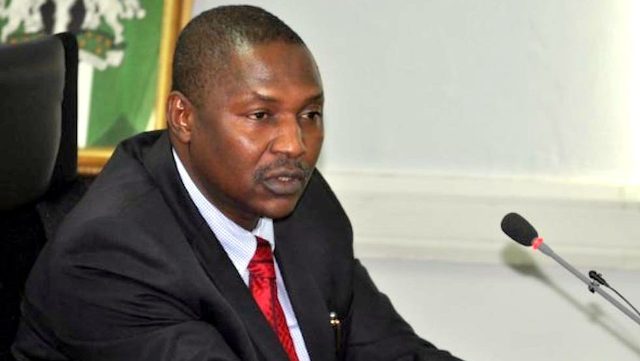The attorney-general of the federation and minister of justice, Abubakar Malami said on Wednesday that the national assembly does not have the power to invite President Muhammadu Buhari to speak on security matters.
It would be recalled that the House had, in the wake of the recent beheading of over 60 rice farmers in Borno State by the Boko Haram insurgents, summoned the president to appear before it.
Consequently, presidential aide, Ms. Lauretta Onochie hinted that Buhari would appear before a joint session of the national assembly on Thursday.
But in a statement entitled ‘Buhari’s summon: NASS operates outside constitutional bounds’ Malami contended that security matters remain the exclusive preserve of the executive.
“The management and control of the security sector is exclusively vested in the President by Section 218 (1) of the Constitution as the Commander-in-Chief of the Armed Forces including the power to determine the operational use of the Armed Forces. An invitation that seeks to put the operational use of the Armed Forces to a public interrogation is indeed taking the constitutional rights of law-making beyond bounds.
“As the commander-in-chief, the president has exclusivity on security and has confidentiality over security. These powers and rights he does not share. So, by summoning the President on national security operational matters, the House of Representative operated outside constitutional bounds. President’s exclusivity of constitutional confidentiality investiture within the context of the constitution remains sacrosanct.”
Malami said the president could freely address the national assembly when he wants but could not be summoned to do so.
“Mr. President has enjoyed constitutional privileges attached to the office of the president including exclusivity and confidentiality investiture in security operational matters, which remains sacrosanct.”
He added that the national assembly has no “constitutional power to envisage or contemplate a situation where the president would be summoned by the national assembly on operational use of the armed forces.
“The right of the president to engage the national assembly and appear before it is inherently discretionary in the president and not at the behest of the national assembly.”
He said Buhari had been able to effectively tackle insecurity and recover lands that were hitherto occupied by Boko Haram.
“President Muhammadu Buhari of the Federal Republic of Nigeria has recorded tremendous success in containing the hitherto incessant bombing, colossal killings, wanton destruction of lives and property that bedeviled the country before attaining the helm of affairs of the country in 2015.
“The confidentiality of strategies employed by the President as the commander-in-Chief of the Armed Forces of the Federal Republic of Nigeria is not open for public exposure in view of security implications in probable undermining of the war against terror.
“The fact that President Muhammadu Buhari was instrumental to the reclaiming of over 14 local governments previously controlled by the Boko Haram in northeast is an open secret, the strategies for such achievement are not open for public expose,” he added.
Malami condoled the bereaved families and sympathised with the victims of insecurity in the country, but maintained that national security is not about publicity and the nation’s security architecture cannot be exposed for the sake of getting publicity.






















































